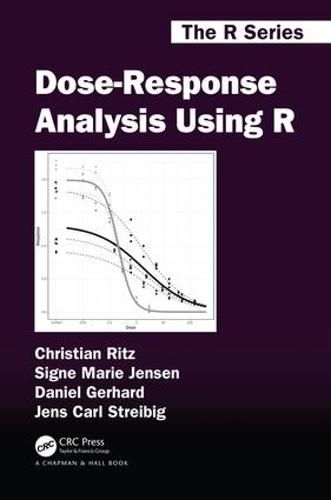Readings Newsletter
Become a Readings Member to make your shopping experience even easier.
Sign in or sign up for free!
You’re not far away from qualifying for FREE standard shipping within Australia
You’ve qualified for FREE standard shipping within Australia
The cart is loading…






Nowadays the term dose-response is used in many different contexts and many different scientific disciplines including agriculture, biochemistry, chemistry, environmental sciences, genetics, pharmacology, plant sciences, toxicology, and zoology.
In the 1940 and 1950s, dose-response analysis was intimately linked to evaluation of toxicity in terms of binary responses, such as immobility and mortality, with a limited number of doses of a toxic compound being compared to a control group (dose 0). Later, dose-response analysis has been extended to other types of data and to more complex experimental designs. Moreover, estimation of model parameters has undergone a dramatic change, from struggling with cumbersome manual operations and transformations with pen and paper to rapid calculations on any laptop. Advances in statistical software have fueled this development.
Key Features:
Provides a practical and comprehensive overview of dose-response analysis.
Includes numerous real data examples to illustrate the methodology.
R code is integrated into the text to give guidance on applying the methods.
Written with minimal mathematics to be suitable for practitioners.
Includes code and datasets on the book’s GitHub: https://github.com/DoseResponse.
This book focuses on estimation and interpretation of entirely parametric nonlinear dose-response models using the powerful statistical environment R. Specifically, this book introduces dose-response analysis of continuous, binomial, count, multinomial, and event-time dose-response data. The statistical models used are partly special cases, partly extensions of nonlinear regression models, generalized linear and nonlinear regression models, and nonlinear mixed-effects models (for hierarchical dose-response data). Both simple and complex dose-response experiments will be analyzed.
$9.00 standard shipping within Australia
FREE standard shipping within Australia for orders over $100.00
Express & International shipping calculated at checkout
Nowadays the term dose-response is used in many different contexts and many different scientific disciplines including agriculture, biochemistry, chemistry, environmental sciences, genetics, pharmacology, plant sciences, toxicology, and zoology.
In the 1940 and 1950s, dose-response analysis was intimately linked to evaluation of toxicity in terms of binary responses, such as immobility and mortality, with a limited number of doses of a toxic compound being compared to a control group (dose 0). Later, dose-response analysis has been extended to other types of data and to more complex experimental designs. Moreover, estimation of model parameters has undergone a dramatic change, from struggling with cumbersome manual operations and transformations with pen and paper to rapid calculations on any laptop. Advances in statistical software have fueled this development.
Key Features:
Provides a practical and comprehensive overview of dose-response analysis.
Includes numerous real data examples to illustrate the methodology.
R code is integrated into the text to give guidance on applying the methods.
Written with minimal mathematics to be suitable for practitioners.
Includes code and datasets on the book’s GitHub: https://github.com/DoseResponse.
This book focuses on estimation and interpretation of entirely parametric nonlinear dose-response models using the powerful statistical environment R. Specifically, this book introduces dose-response analysis of continuous, binomial, count, multinomial, and event-time dose-response data. The statistical models used are partly special cases, partly extensions of nonlinear regression models, generalized linear and nonlinear regression models, and nonlinear mixed-effects models (for hierarchical dose-response data). Both simple and complex dose-response experiments will be analyzed.